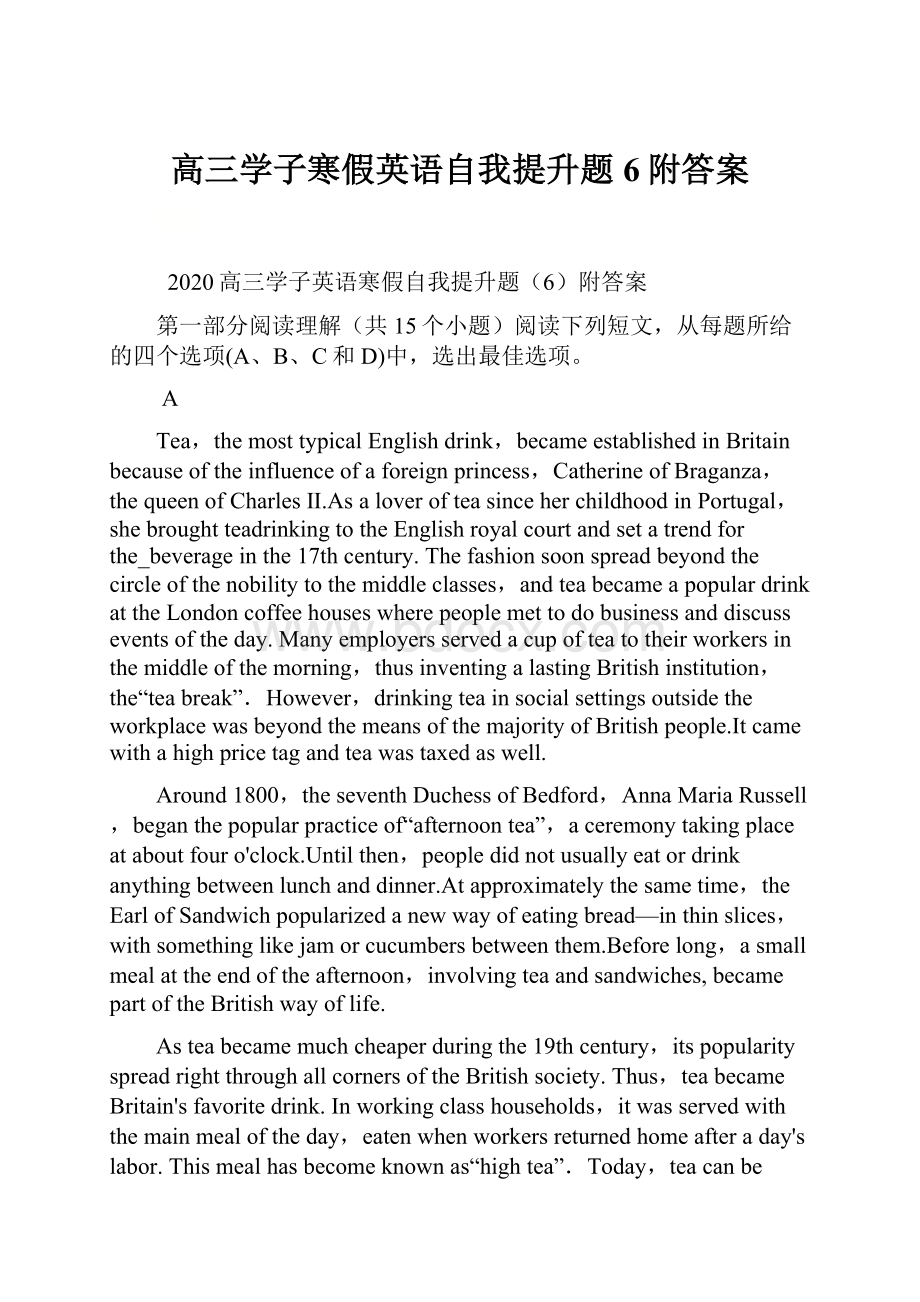高三学子寒假英语自我提升题6附答案.docx
《高三学子寒假英语自我提升题6附答案.docx》由会员分享,可在线阅读,更多相关《高三学子寒假英语自我提升题6附答案.docx(12页珍藏版)》请在冰豆网上搜索。

高三学子寒假英语自我提升题6附答案
2020高三学子英语寒假自我提升题(6)附答案
第一部分阅读理解(共15个小题)阅读下列短文,从每题所给的四个选项(A、B、C和D)中,选出最佳选项。
A
Tea,themosttypicalEnglishdrink,becameestablishedinBritainbecauseoftheinfluenceofaforeignprincess,CatherineofBraganza,thequeenofCharlesⅡ.AsaloverofteasinceherchildhoodinPortugal,shebroughttea�drinkingtotheEnglishroyalcourtandsetatrendforthe_beverageinthe17thcentury.Thefashionsoonspreadbeyondthecircleofthenobilitytothemiddleclasses,andteabecameapopulardrinkattheLondoncoffeehouseswherepeoplemettodobusinessanddiscusseventsoftheday.Manyemployersservedacupofteatotheirworkersinthemiddleofthemorning,thusinventingalastingBritishinstitution,the“teabreak”.However,drinkingteainsocialsettingsoutsidetheworkplacewasbeyondthemeansofthemajorityofBritishpeople.Itcamewithahighpricetagandteawastaxedaswell.
Around1800,theseventhDuchessofBedford,AnnaMariaRussell,beganthepopularpracticeof“afternoontea”,aceremonytakingplaceataboutfouro'clock.Untilthen,peopledidnotusuallyeatordrinkanythingbetweenlunchanddinner.Atapproximatelythesametime,theEarlofSandwichpopularizedanewwayofeatingbread—inthinslices,withsomethinglikejamorcucumbersbetweenthem.Beforelong,asmallmealattheendoftheafternoon,involvingteaandsandwiches,becamepartoftheBritishwayoflife.
Asteabecamemuchcheaperduringthe19thcentury,itspopularityspreadrightthroughallcornersoftheBritishsociety.Thus,teabecameBritain'sfavoritedrink.Inworking�classhouseholds,itwasservedwiththemainmealoftheday,eatenwhenworkersreturnedhomeafteraday'slabor.Thismealhasbecomeknownas“hightea”.Today,teacanbedrunkatanytimeoftheday,andaccountsforovertwo�fifthsofalldrinksconsumedinBritain—
1.Whatdotheunderlinedwords“thebeverage”probablyreferto?
A.Teadrinking.
B.Asmallmeal.
C.Awayofeatingbread.
D.Achoiceofdrinks.
2.WhywasteaunabletobeacceptedasacommondrinkinBritaininthe17thcentury?
A.ItwasmerelyservedinLondon.
B.Itwastaxedasanalcoholicdrink.
C.Itwasforbiddeninbusinesssettings.
D.Itwastooexpensiveformostpeople.
3.Howisthetextorganized?
A.Bycauseandeffect.
B.Bycomparison.
C.Intimeorder.
D.Infrequencyorder.
B
Whilethestartofanewschoolyearisalwaysexciting,thisyearwasevenmoresoforsomeelementaryschoolstudentsinAuckland,NewZealand.Theybecametheworld’sfirstkidstobe"taught"byadigitalteacher.Beforeyoustartimaginingahuman-likerobotwalkingaroundtheclassroom,Willisjustanavatarthatappearsonthestudent’sdesktop,orsmartphonescreen,whenorderedtocome.
Theautonomousanimationplatformhasbeenmodeledafterthehumanbrainandnervoussystem,allowingittoshowhuman-likebehavior.ThedigitalteacherisassignedtoteachVector’s"Besustainablewithenergy"—afreeprogramforAucklandelementaryschools.
Justlikethehumansitreplaced,Willisabletoinstantlyreacttothestudents’responsestothetopic.Thankstoawebcamandmicrophone,theavatarnotonlyrespondstoquestionsthekidsmayhave,butalsopicksupnon-verbalcues.Forinstance,ifastudentsmilesatWill,herespondsbysmilingback.Thistwo-wayinteractionnotonlyhelpsattractthestudents’attention,butalsoallowstheprogram’sdeveloperstomonitortheirengagement,andmakechangesifneeded.
NikhilRavishankarbelievesthatWill-likeavatarscouldbeanovelwaytocatchtheattentionofthenextgeneration.Hesays,"Ihavealotofhopeinthistechnologyasameanstodelivercost-effective,rich,educationalexperienceinthefuture."
Theprogram,inplacesinceAugust2018,hasbeenagreatsuccessthusfar.Ravishankarsays,"WhatwasfascinatingtomewasthereactionofthechildrentoWill.Thewaytheylookattheworldissocreativeanddifferent,andWillreallycapturedtheirattention."However,regardlessofhowpopularitbecomes,Willisunlikelytoreplacehumaneducatorsanytimesoon.
4.WhatwasspecialforsomeelementaryschoolstudentsinAuckland?
A.Adigitalteachertaughtthem.
B.Theyfirstsawsomethingdigital.
C.Thiswasthestartofanewschoolyear.
D.Theycouldgetclosetosmartphonescreen.
5.Whatisthebenefitofthistwo-wayinteraction?
A.Itcansmileback.
B.Itcanusemicrophone.
C.Itcanchangeifnecessary.
D.Itcantalkanytopicforfree.
6.What’sRavishankar’sattitudetoWill’sreplacingHumaneducatorssoon?
A.Optimistic.B.Doubtful.C.Unclear.D.Disapproving.
7.Whatmightbethebesttitleforthepassage?
A.NewHigh-techContributestoEducation
B.NewZealandWillReplaceTeachersinClassrooms
C.TheWorld’sFirstDigitalTeacher,aHelptoStudents
D.TheWorld’sFirstDigitalTeacherAppearsinClassrooms
C
It’scoldanddarkoutside,andyourbedissowarmandcomfortable.Goingforarunseemslikesuchabadidea.Butbeforeyouhideyourrunningshoes,itmightbeworthgivingthatcrazyideaago.
AccordingtoTheHuffingtonPost,anoutdoorruninwinterburnsmorecaloriesbecausethebodyisworkinghardtoregulate(调节)itscoretemperature.Furthermore,researchshowsthatracetimeisfasterincoldweatherthaninwarmweather—andquickerrunsburnmorecalories.Similarly,coldweatheralsomakestheheartworkhardertodistributebloodthroughthebody,makingthemuscleevenstronger.
Outdoorexercisealsoburnsupyourenergyandridsyouofthestressanddepressionthatbuildupeveryday.Theheatandhumidity(湿气)insummercandragyoudownandtireyoufaster,butcoldweatherisrefreshing.Itadjusts(调整)youtoyoursurroundings,makingyoufeelalive.
Ofcourse,thethreatofsmoginsomebuilt-upareasisabigproblemtowinterexercise.Heartattacks,strokes,andlungcancerarealldangersofrunninginsmog.Thecombinationofairpollutionandexerciseincreasesthepotentialproblems.Ifyoudochoosetorunoutsideonsmoggydays,takeapathinaparkorresidentialareatoavoidcarexhaust(废气),andgoearlyinthemorning,beforerushhour.Butstayinginsideonsmoggydaysandwaitingforthenextcleardaytorunisbest.
8.Howcanweunderstandtheunderlinedpartinparagraph1?
A.tryingthecrazyidea
B.passingthecrazyidea
C.givingupthecrazyidea
D.forgettingthecrazyidea
9.Howdoescoldweatherbenefitrunnerscomparedwithwarmweather?
A.Theycanrunmoreslowly.
B.Theycantakeinmorecalories.
C.Theirheartscanfunctionharder.
D.Theirbodytemperaturecangetlower.
10.Howdoessummeraffectrunners?
A.Itcausesheartattacks.
B.Itlessensrunners’stress.
C.Itmakesrunnerstiredeasily.
D.Itbuildsuptheirenergyquickly.
11.Whatshouldtherunnersdoonsmoggydays?
A.Stopdrivingcars.
B.Domoreexercise.
C.Runlateinthemorning.
D.Avoidoutdoorexercise.
D
InJanuary1958,RachelCarsonreceivedaletterfromherfriendOlgaOwensHuckins.HuckinslivedinanareaofMassachusettswherethestatewastryingtogetridofmosquitoes.Theyhadusedplanestospray(喷)amixtureoffueloilandDDT(apesticide,whichcankillpestssuchasinsects,weedsandrodents)allovertheareaaroundHuckins’home.DDTwassupposedlyharmlessbut,themorningafterthespraying,Huckinsfoundseveralofherfavoritebirdsdeadoutsideherhouse.Andthesprayingdidnotevenkillallofthemosquitoes;infact,thatsummerthereweremoreofthemthaneverbefore.HuckinsaskedCarsonifsheknewsomeoneinWashingtonthatcouldhelppreventfuturespraying.
CarsonhadbeenhearingaboutDDTsinceaSwisschemistdiscovereditcouldbeusedtokillinsectsin1939.Tomanypeople,DDTseemedlikeamiraclesubstance.Farmerswereexcitedaboutsavingtheircropsfrompests.Doctorsandotherswereexcitedaboutsavingpeople’slivesbykillingdisease-carryinginsects.ButtoCarson,DDTappearedtobedangeroustoalllivingcreatures.
ThemoreCarsonfoundoutaboutDDTandotherpesticides,themoresherealizedthatsheneededtohelpstopfuturespraying.Carsondecidedtowriteabookaboutpesticides.Shesaid,"TherewouldbenofuturepeaceformeifIkeptsilent."ShecalledherbookSilentSpring.
Carsonhadspentherlifestudying,observing,andwritingaboutnature.Shewasatrainedbiologistandatalentedwriterwhoknewhowtopresentscientificinformationincompellingstories.BeforeSilentSpring,shehadwrittenotherbooksfromtheperspectiveoffish,birds,islands,andoceans.Carsonknewthatallthingsinnatureexistinadelicately(微妙地)balancedecosystem.InSilentSpring,Carsonwrotethatalthoughtheecosystemcanadjusttochanges,itneedstime.Carsonbelievedthatpeopleinthe1950swereusingpesticidescarelessly.Naturedidn’thavetimetoadjust,wroteCarson,becausesomanypesticideshadbeenusedinsuchlargequantitiesinsuchashorttime.
12.WhydidHuckinswritealettertoRachelCarson?
A.Totellhersomebadnews.
B.Toturntoherforhelp.
C.Toadvisehertowriteabook.
D.Toaskhersomequestions.
13.WhichoftheeffectsthesprayingofthemixtureinMassachusettshadisright?
A.Itkilledpestssuchasinsects,weedsandrodentsaroundHuckins’home.
B.Itkilledallofthemosquitoes.
C.Ithadbadeffectsonecosystem.
D.Thereweremorebirdsthaneverbefore.
14.WhowouldnotbehappywithDDT?
A.Gardeners.B.Farmers.C.Doctors.D.Biologists.
15.What’sthebesttitleofthepassage?
A.RachelCarson’sresearchonnature
B.RachelCarson’slife
C.RachelCarson’sSilentSpring
D.DDT’sbadeffectsonecosystem
第二部分阅读理解七选五:
根据短文内容,从短文后的选项中选出能填入空白处的最佳选项。
选项中有两项为多余选项。
It’snormaltowakebrieflyduringthenight.